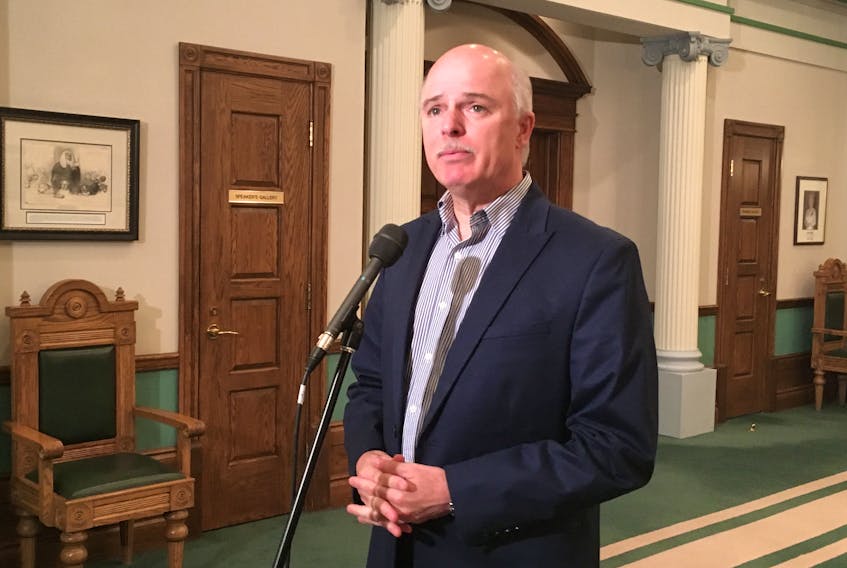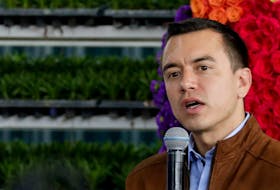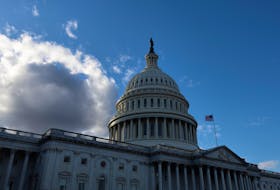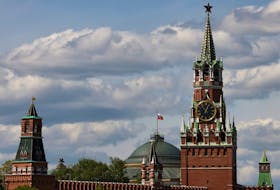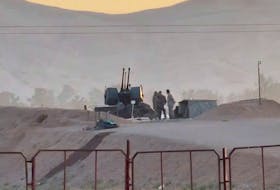Finance Minister Tom Osborne says Newfoundland and Labrador will, first and foremost, continue to work towards financial stability under the Liberal government.
Asked about a VOCM online news article from Aug. 12 — headlined, “Province hopes to provide tax relief in next budget” — the minister said he can’t say yet what will come in Budget 2019.
“If we’re able to afford to provide some levels of relief in Budget 2019 we will. We will only do that if we’re able to do so while still maintaining our plan to return to surplus by 2022-2023 and continue to strengthen the economy of the province,” he told The Telegram in an interview Tuesday morning.
“We’ll only do that as we’re able to afford to do it. The reality is we still have obligations. We have to meet those obligations. We are not going to stray from getting the province back to fiscal stability and strengthening the economy, diversifying the economy. Those are the goals.”
Significant to the tax discussion is the ongoing “independent tax review,” a look at the provincial tax system by a five-member committee, announced in August 2017 and expected to provide recommendations by November 2018.
Osborne said the committee — including Brian Bonnell, Carol Furlong, Marion Pardy, Peter Woodward and chair Stephen Jerrett —provided an update several months ago, indicating their work is on schedule.
“They didn’t give any indication what they are planning or what the report might look like,” he said, adding he looks forward to the results, including information on how Newfoundland and Labrador places in relation to the other provinces when it comes to taxation.
RELATED STORIES
Province reworking maligned levy, will apply to incomes of more than $50,000 (2016)
N.L. government to kill the book tax (2017)
RELATED LINK
He would not rule out the review resulting in some changes by the next provincial budget.
“It depends on what the recommendations are and how hard they are to incorporate. Without seeing them, it’s very difficult to comment on what we may or may not be able to do with the recommendations, but if there are things that are easily implemented in the budget for 2019, we’ll certainly look at those,” he said.
Osborne said there has been some tax relief recently, citing the announced reduction in the tax on auto insurance (to be cut two per cent in 2019 and one per cent for the following three years, bringing it to 10 per cent) and 2018 payroll tax changes, with an estimated 50 additional companies exempted from that tax.
But the Liberals continue to be criticized for new fees and taxes introduced back in Budget 2016, after an election where they took power from the Progressive Conservatives and faced a deficit of $2.2 billion, with a projected deficit of $2.4-billion to $2.7-billion without action.
“The serious fiscal situation that the province faced … you know there were difficult but responsible decisions that had to be made in order to satisfy not only our lenders but bond rating agencies and so on,” Osborne said, commenting on what was brought down by then-Finance Minister Cathy Bennett.
The budget included the introduction of a deficit reduction levy (sometimes called the “temporary deficit reduction levy,” or just “the levy”).
Changes were made to the levy after its initial announcement, following public backlash. Relief from the federal government allowed the province to shift its approach. Instead of the new charge applying to anyone with income of as little as $20,000, the threshold was raised to $50,000, resulting in an estimated 74 per cent of tax filers not having to pay the charge. The requirements also changed for individuals earning more than $50,000, with the tax ultimately described as more progressive.
The levy is legislated (under the Income Tax Act) to disappear after 2019.
The May 2016 change was possible due to a federal decision to defer repayment of loans received under the equalization program. The loans came to offset the negative effect of a change in the equalization formula in 2004, with repayment due to start at about $27 million a year. Repayment was delayed to 2022.
Also in Budget 2016, the Liberals announced the provincial portion of HST charged on book sales would be applied again. The cost of a book went up for consumers, but that decision was also rolled back, with Osborne announcing the move in 2017. What was referred to simply as the “book tax” was removed as of Jan. 1, 2018.
The “temporary gas tax,” meanwhile, was also introduced in the Liberals’ first budget. The cost of gas was pushed up by 16.5 cents per litre, with diesel and aviation fuel also going up by varying amounts. The cost of home heating oil wasn’t raised.
The added tax has since been cut back, by 8.5 cents in June 2017, reduced by another four cents at the end of 2017. The Liberals have committed to removing the remaining four cents.
At the same time, the federal government has stated an intent to impose a carbon tax, with suggestions the province could add on a carbon-related tax on gas, essentially swapping the remaining temporary gas tax for carbon tax.
But the province has yet to settle carbon tax with the federal government and announce the details of its carbon pricing plans.
Looking ahead, from former auditor general Terry Paddon to, more recently, bond rating agencies, there have been concerns expressed over what Muskrat Falls project costs and Hydro costs could mean for the province and the public coffers in the next few years.
Budget 2019 is expected to be, under existing schedules, the last before the next provincial and federal election.

